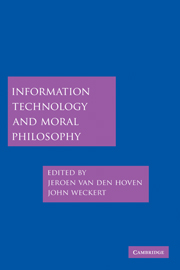Book contents
- Frontmatter
- Contents
- List of Contributors
- Introduction
- 1 Norbert Wiener and the Rise of Information Ethics
- 2 Why We Need Better Ethics for Emerging Technologies
- 3 Information Ethics: Its Nature and Scope
- 4 The Transformation of the Public Sphere: Political Authority, Communicative Freedom, and Internet Publics
- 5 Democracy and the Internet
- 6 The Social Epistemology of Blogging
- 7 Plural Selves and Relational Identity: Intimacy and Privacy Online
- 8 Identity and Information Technology
- 9 Trust, Reliance, and the Internet
- 10 Esteem, Identifiability, and the Internet
- 11 Culture and Global Networks: Hope for a Global Ethics?
- 12 Collective Responsibility and Information and Communication Technology
- 13 Computers as Surrogate Agents
- 14 Moral Philosophy, Information Technology, and Copyright: The Grokster Case
- 15 Information Technology, Privacy, and the Protection of Personal Data
- 16 Embodying Values in Technology: Theory and Practice
- 17 Information Technology Research Ethics
- 18 Distributive Justice and the Value of Information: A (Broadly) Rawlsian Approach
- Select Bibliography
- Index
- References
6 - The Social Epistemology of Blogging
Published online by Cambridge University Press: 21 July 2009
- Frontmatter
- Contents
- List of Contributors
- Introduction
- 1 Norbert Wiener and the Rise of Information Ethics
- 2 Why We Need Better Ethics for Emerging Technologies
- 3 Information Ethics: Its Nature and Scope
- 4 The Transformation of the Public Sphere: Political Authority, Communicative Freedom, and Internet Publics
- 5 Democracy and the Internet
- 6 The Social Epistemology of Blogging
- 7 Plural Selves and Relational Identity: Intimacy and Privacy Online
- 8 Identity and Information Technology
- 9 Trust, Reliance, and the Internet
- 10 Esteem, Identifiability, and the Internet
- 11 Culture and Global Networks: Hope for a Global Ethics?
- 12 Collective Responsibility and Information and Communication Technology
- 13 Computers as Surrogate Agents
- 14 Moral Philosophy, Information Technology, and Copyright: The Grokster Case
- 15 Information Technology, Privacy, and the Protection of Personal Data
- 16 Embodying Values in Technology: Theory and Practice
- 17 Information Technology Research Ethics
- 18 Distributive Justice and the Value of Information: A (Broadly) Rawlsian Approach
- Select Bibliography
- Index
- References
Summary
DEMOCRACY AND THE EPISTEMIC PROPERTIES OF INTERNET-BASED COMMUNICATION
The impact of the Internet on democracy is a widely discussed subject. Many writers view the Internet, potentially at least, as a boon to democracy and democratic practices. According to one popular theme, both e-mail and Web pages give ordinary people powers of communication that have hitherto been the preserve of the relatively wealthy (Graham 1999, p. 79). So the Internet can be expected to close the influence gap between wealthy citizens and ordinary citizens, a weakness of many procedural democracies.
I want to focus here on another factor important to democracy, a factor that is emphasized by so-called epistemic approaches to democracy. According to epistemic democrats, democracy exceeds other systems in its ability to ‘track the truth’. According to Rousseau, for example, the people under a democracy can track truths about the ‘general will’ and the ‘common good’ (Rousseau 1762, book 4). Recent proponents of epistemic democracy include Estlund (1990, 1993), Grofman and Feld (1988), and List and Goodin (2001). Their idea is that, assuming certain political outcomes are ‘right’ or ‘correct’, democracy is better than competing systems at choosing these outcomes.
Elsewhere, I have proposed a variant on the epistemic approach to democracy (Goldman 1999, chapter 10). Epistemic theorists of democracy usually assume that, on a given issue or option, the same option or candidate is right, or correct, for all voters. A system's competence with respect to that issue is its probability of selecting the correct option.
- Type
- Chapter
- Information
- Information Technology and Moral Philosophy , pp. 111 - 122Publisher: Cambridge University PressPrint publication year: 2008
References
- 32
- Cited by



